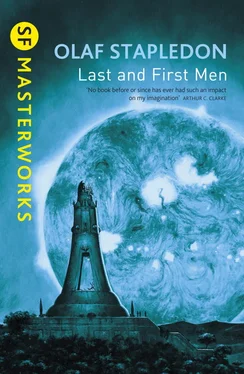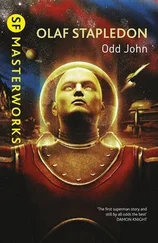Olaf Stapledon - Last and First Men
Здесь есть возможность читать онлайн «Olaf Stapledon - Last and First Men» весь текст электронной книги совершенно бесплатно (целиком полную версию без сокращений). В некоторых случаях можно слушать аудио, скачать через торрент в формате fb2 и присутствует краткое содержание. Город: London, Год выпуска: 1999, ISBN: 1999, Издательство: Orion Publishing Group, Жанр: Фантастика и фэнтези, на английском языке. Описание произведения, (предисловие) а так же отзывы посетителей доступны на портале библиотеки ЛибКат.
- Название:Last and First Men
- Автор:
- Издательство:Orion Publishing Group
- Жанр:
- Год:1999
- Город:London
- ISBN:978-1-857-98806-2
- Рейтинг книги:3 / 5. Голосов: 1
-
Избранное:Добавить в избранное
- Отзывы:
-
Ваша оценка:
- 60
- 1
- 2
- 3
- 4
- 5
Last and First Men: краткое содержание, описание и аннотация
Предлагаем к чтению аннотацию, описание, краткое содержание или предисловие (зависит от того, что написал сам автор книги «Last and First Men»). Если вы не нашли необходимую информацию о книге — напишите в комментариях, мы постараемся отыскать её.
is full of pioneering speculations about evolution, terraforming, genetic engineering and many other subjects.
Last and First Men — читать онлайн бесплатно полную книгу (весь текст) целиком
Ниже представлен текст книги, разбитый по страницам. Система сохранения места последней прочитанной страницы, позволяет с удобством читать онлайн бесплатно книгу «Last and First Men», без необходимости каждый раз заново искать на чём Вы остановились. Поставьте закладку, и сможете в любой момент перейти на страницу, на которой закончили чтение.
Интервал:
Закладка:
4. THE CATASTROPHE
It was in these latter days that the Patagonians discovered the civilization that had preceded them. In rejecting the ancient religion of fear, they had abandoned also the legend of a remote magnificence, and had come to regard themselves as pioneers of the mind. In the new continent which was their homeland there were, of course, no relics of the ancient order; and the ruins that besprinkled the older regions had been explained as mere freaks of nature. But latterly, with the advance of natural knowledge, archaeologists had reconstructed something of the forgotten world. And the crisis came when, in the basement of a shattered pylon in China, they found a store of metal plates (constructed of an immensely durable artificial element), on which were embossed crowded lines of writing. These objects were, in fact, blocks from which books were printed a thousand centuries earlier. Other deposits were soon discovered, and bit by bit the dead language was deciphered. Within three centuries the outline of the ancient culture was laid bare; and presently the whole history of man’s rise and ruin fell upon this latter-day civilization with crushing effect, as though an ancient pylon were to have fallen on a village of wigwams at its foot. The pioneers discovered that all the ground which they had so painfully won from the wild had been conquered long ago, and lost; that on the material side their glory was nothing beside the glory of the past; and that in the sphere of mind they had established only a few scattered settlements where formerly was an empire. The Patagonian system of natural knowledge had been scarcely further advanced than that of preNewtonian Europe. They had done little more than conceive the scientific spirit and unlearn a few superstitions. And now suddenly they came into a vast inheritance of thought.
This in itself was a gravely disturbing experience for a people of strong intellectual interest. But even more overwhelming was the discovery, borne in on them in the course of their research, that the past had been not only brilliant but crazy, and that in the long run the crazy element had completely triumphed. For the Patagonian mind was by now too sane and empirical to accept the ancient knowledge without testing it. The findings of the archaeologists were handed over to the physicists and other scientists, and the firm thought and valuation of Europe and America at their zenith were soon distinguished from the degenerate products of the World State.
The upshot of this impact with a more developed civilization was dramatic and tragic. It divided the Patagonians into loyalists and rebels, into those who clung to the view that the new learning was a satanic lie, and those who faced the facts. To the former party the facts were thoroughly depressing; the latter, though overawed, found in them a compelling majesty, and also a hope. That the earth was a mote among the star-clouds was the least subversive of the new doctrines, for the Patagonians had already abandoned the geocentric view. What was so distressing to the reactionaries was the theory that an earlier race had long ago possessed and spent the vitality that they themselves so craved. The party of progress, on the other hand, urged that this vast new knowledge must be used; and that, thus equipped, Patagonia might compensate for lack of youthfulness by superior sanity.
This divergence of will resulted in a physical conflict such as had never before occurred in the Patagonian world. Something like nationalism emerged. The more vigorous Antarctic coasts became modern, while Patagonia itself clung to the older culture. There were several wars, but as physics and chemistry advanced in Antarctica, the Southerners were able to devise engines of war which the Northerners could not resist. In a couple of centuries the new “culture” had triumphed. The world was once more unified.
Hitherto Patagonian civilization had been of a mediaeval type. Under the influence of physics and chemistry it began to change. Wind-and waterpower began to be used for the generation of electricity. Vast mining operations were undertaken in search of the metals and other minerals which no longer occurred at easy depths. Architecture began to make use of steel. Electrically driven aeroplanes were made, but without real success. And this failure was symptomatic; for the Patagonians were not sufficiently foolhardy to master aviation, even had their planes been more efficient. They themselves naturally attributed their failure wholly to lack of a convenient source of power, such as the ancient petrol. Indeed this lack of oil and coal hampered them at every turn. Volcanic power, of course, was available; but, never having been really mastered by the more resourceful ancients, it defeated the Patagonians completely.
As a matter of fact, in wind and water they had all that was needed. The resources of the whole planet were available, and the world population was less than a hundred million. With this source alone they could never, indeed, have competed in luxury with the earlier World State, but they might well have achieved something like Utopia.
But this was not to be. Industrialism, though accompanied by only a slow increase of population, produced in time most of the social discords which had almost ruined their predecessors. To them it appeared that all their troubles would be solved if only their material power were far ampler. This strong and scarcely rational conviction was a symptom of their ruling obsession, the craving for increased vitality.
Under these circumstances it was natural that one event and one strand of ancient history should fascinate them. The secret of limitless material power had once been known and lost. Why should not Patagonians rediscover it, and use it, with their superior sanity, to bring heaven on earth? The ancients, no doubt, did well to forgo this dangerous source of power; but the Patagonians, level-headed and single-minded, need have no fear. Some, indeed, considered it less important to seek power than to find a means of checking biological senescence; but, unfortunately, though physical science had advanced so rapidly, the more subtle biological sciences had remained backward, largely because among the ancients themselves little more had been done than to prepare their way. Thus it happened that the most brilliant minds of Patagonia, fascinated by the prize at stake, concentrated upon the problem of matter. The state encouraged this research by founding and endowing laboratories whose avowed end was this sole work.
The problem was difficult, and the Patagonian scientists, though intelligent, were somewhat lacking in grit. Only after some five hundred years of intermittent research was the secret discovered, or partially so. It was found possible, by means of a huge initial expenditure of energy, to annihilate the positive and negative electric charges in one not very common kind of atom. But this limitation mattered not at all; the human race now possessed an inexhaustible source of power which could be easily manipulated and easily controlled. But though controllable, the new gift was not foolproof; and there was no guarantee that those who used it might not use it foolishly, or inadvertently let it get out of hand.
Unfortunately, at the time when the new source of energy was discovered, the Patagonians were more divided than of old. Industrialism, combined with the innate docility of the race, had gradually brought about a class cleavage more extreme even than that of the ancient world, though a cleavage of a curiously different kind. The strongly parental disposition of the average Patagonian prevented the dominant class from such brutal exploitation as had formerly occurred. Save during the first century of industrialism, there was no serious physical suffering among the proletariat. A paternal government saw to it that all Patagonians were at least properly fed and clothed, that all had ample leisure and opportunities of amusement. At the same time they saw to it also that the populace became more and more regimented. As in the First World State, civil authority was once more in the hands of a small group of masters of industry, but with a difference. Formerly the dominant motive of big business had been an almost mystical passion for the creation of activity; now the ruling minority regarded themselves as standing towards the populace in loco parentis , and aimed at creating “a young-hearted people, simple, gay, vigorous and loyal.” Their ideal of the state was something between a preparatory school under a sympathetic but strict adult staff, and a jointstock company, in which the shareholders retained only one function, to delegate their powers thankfully to a set of brilliant directors.
Читать дальшеИнтервал:
Закладка:
Похожие книги на «Last and First Men»
Представляем Вашему вниманию похожие книги на «Last and First Men» списком для выбора. Мы отобрали схожую по названию и смыслу литературу в надежде предоставить читателям больше вариантов отыскать новые, интересные, ещё непрочитанные произведения.
Обсуждение, отзывы о книге «Last and First Men» и просто собственные мнения читателей. Оставьте ваши комментарии, напишите, что Вы думаете о произведении, его смысле или главных героях. Укажите что конкретно понравилось, а что нет, и почему Вы так считаете.











